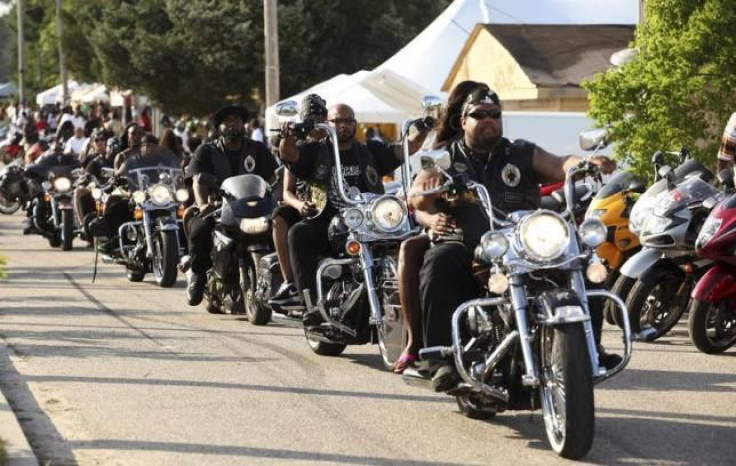After Texas Shootout, Summer Biker Rallies Bring Rumble Of Concern

After three people were killed and seven wounded in shootings during a motorcycle rally last year in Myrtle Beach, South Carolina, Gov. Nikki Haley and others called for an end to an event that draws thousands to the family-friendly beach town.
Their efforts were unsuccessful. This weekend, bikers will return to Myrtle Beach -- just a week after a bloody motorcycle gang shootout in Waco, Texas. But this time authorities are more prepared, with dozens of new surveillance cameras and a police force three times the size of last year’s.
As a season of motorcycle rallies across the country begins this Memorial Day weekend, the outbreak of violence at biker gatherings has put notorious clubs like the Bandidos, the Hells Angels and the Cossacks under intense public scrutiny.
And after the bloodshed in Waco last Sunday, experts predict the outlaw clubs will keep an even lower profile than usual at this summer's rallies.
"A lot of them are going to be even more underground just because of all the heat," said Steve Cook, executive director of the Midwest Outlaw Motorcycle Gang Investigators Association.
In Waco, nine people died and 170 were arrested after a simmering dispute between rival gang members flared at a sports bar, where bikers attacked one another with guns, knives, clubs, brass knuckles and chains.
The main adversaries were the Bandidos, considered a criminal organization by the U.S. Justice Department, and the Cossacks, who experts say have been fighting for control in Texas.
The Bandidos show up every year for the Red River Memorial Day Motorcycle Rally in New Mexico, said Town Marshal David Smith.
But the gang and others like it have caused no problems at recent rallies, attended by about 20,000 people annually, Smith said. Intelligence reports indicate the gangs involved in the Texas shootout are not planning to make trouble in New Mexico. But an isolated incident could escalate.
"The issues we deal with are usually from someone who may be wanting to make a name for themselves and tries to harass or in some way antagonize an outlaw motorcycle gang member," Smith said.
COOLER HEADS, FOR NOW
James Quinn, a University of North Texas professor who studies outlaw motorcycle clubs, agrees the likelihood of violence this weekend is low.
"I think cooler heads will prevail, at least for a while, but I expect that there will be more problems down the road," he said. "Honor has been offended. Blood has been shed."
Regardless, police officials say they feel prepared.
Instances of violence have been rare at the Sturgis Motorcycle Rally in South Dakota, expected to draw as many as a million people in August for its 75th anniversary, said Police Chief Jim Bush.
More common, he said, are the sort of disruptions police see when any large group of people gather to party: drunk driving, domestic spats and traffic crashes.
The last time major violence erupted at New Hampshire's Laconia Motorcycle Week, believed to be the oldest motorcycle rally in the country, was in 1998, when riots broke out involving the Hells Angels. Observers of the event, set to begin on June 13, say it is now far less wild than it once was.
Charlie St. Clair, executive director of the Laconia Motorcycle Week Association, said the riders who come to the rally are like anyone you might encounter. “Some you might want to hang out with, some maybe not,” he said.
Many of the thousands of motorcyclists coming to Washington, D.C., this weekend for the Rolling Thunder "Ride for Freedom" to honor military veterans are sure to be bankers, lawyers and other white-collar workers.
Among an older, more affluent set, riding has grown in popularity. Recreational riders are generally safe around the gangs as long as they keep a respectable distance and never touch their motorcycles.
In South Carolina, police are being warned that several criminal street gangs not affiliated with motorcycle groups are planning to attend the Atlantic Beach Bikefest, which attracts a younger crowd of African-American sport motorcycle riders rather than the largely white, older crowd at other rallies.
While pastors and residents in Myrtle Beach are holding vigils to pray for calm, a sheriff in Texas went directly to a gang to appeal for peace.
Palo Pinto County Sheriff Ira Mercer said he asked the Cossacks to cancel their annual rally this weekend west of Fort Worth after the group lost seven members in the Waco shooting. Gang leaders were hesitant but obliged.
"It was the prudent thing to do," Mercer said.
© Copyright IBTimes 2024. All rights reserved.











